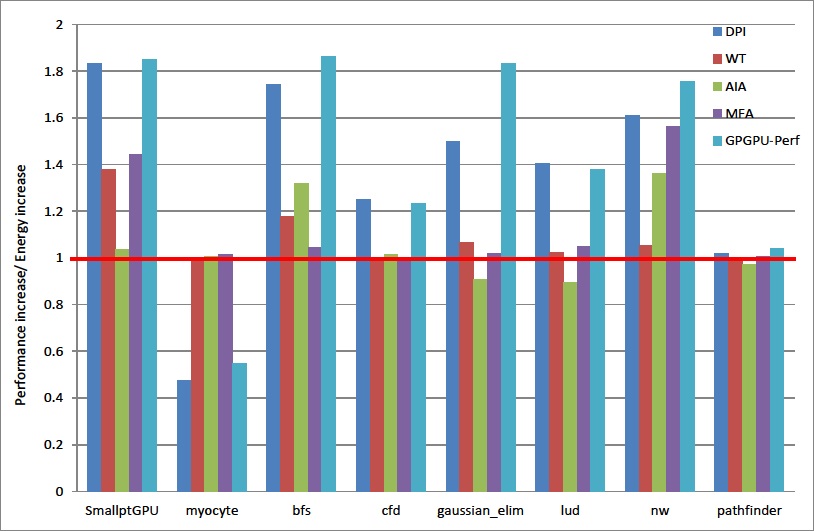|
GPGPU-Perf: Efficient, Interval-based DVFS Algorithm for Mobile GPGPU Applications
SeongKi Kim and Young J. Kim Department of Computer Science & Engineering Ewha Womans University, Seoul, Korea skkim9226@gmail.com, kimy@ewha.ac.kr
Visual Computer, Vol 31, Issue 6 - 8
(Presented at the Computer Graphics International 2015) [paper]
|
||||||||||||||||||
|
Abstract Although general purpose computation on graphics processing unit (GPGPU) technologies are available even on GPUs, its performance has been seriously affected by the underlying dynamic voltage and frequency scaling (DVFS) mechanism of GPU. In order to save the energy, eventually prolonging the battery life, the DVFS adjusts the GPU's frequency according to the past utilization. When the GPU processes graphic tasks only, it is enough to process them within a fixed time (typically 30 ~ 60 frames per second), so the DVFS parameters can be conservatively set. However, in GPGPU case, the GPU should process them at much higher rates depending on applications. Although a modification to DVFS parameters may improve the GPGPU performance, the energy efficiency is sacrificed, and the performance of graphic tasks is affected, as these parameters are shared by both graphic and GPGPU tasks. In order to improve the GPGPU performance without influencing the graphic performance, we devise the new GPGPU-Perf algorithm that adjusts the DVFS parameters such as thresholds and an interval. The new algorithm controls the frequency more intelligently for mobile GPGPU applications, and thus the performance over energy increases by 1.44 times with no influences to graphic tasks and any modifications of GPGPU algorithms. To the best of our knowledge, this paper is the first work that proposes a GPU DVFS algorithm for GPGPU applications.
|
||||||||||||||||||
|
Benchmarking Scenarios 1. The ratio of performance increase and energy consumption increase The GPGPU-Perf algorithm complements each individual DVFS strategy.
2. Performance improvements and energy consumption improvements The performance increases almost double in average.
|
||||||||||||||||||
|
Copyright 2015 Computer Graphics Laboratory Dept of Computer Science & Engineering Ewha Womans University, Seoul, Korea Last update: 2015-07-06 |
